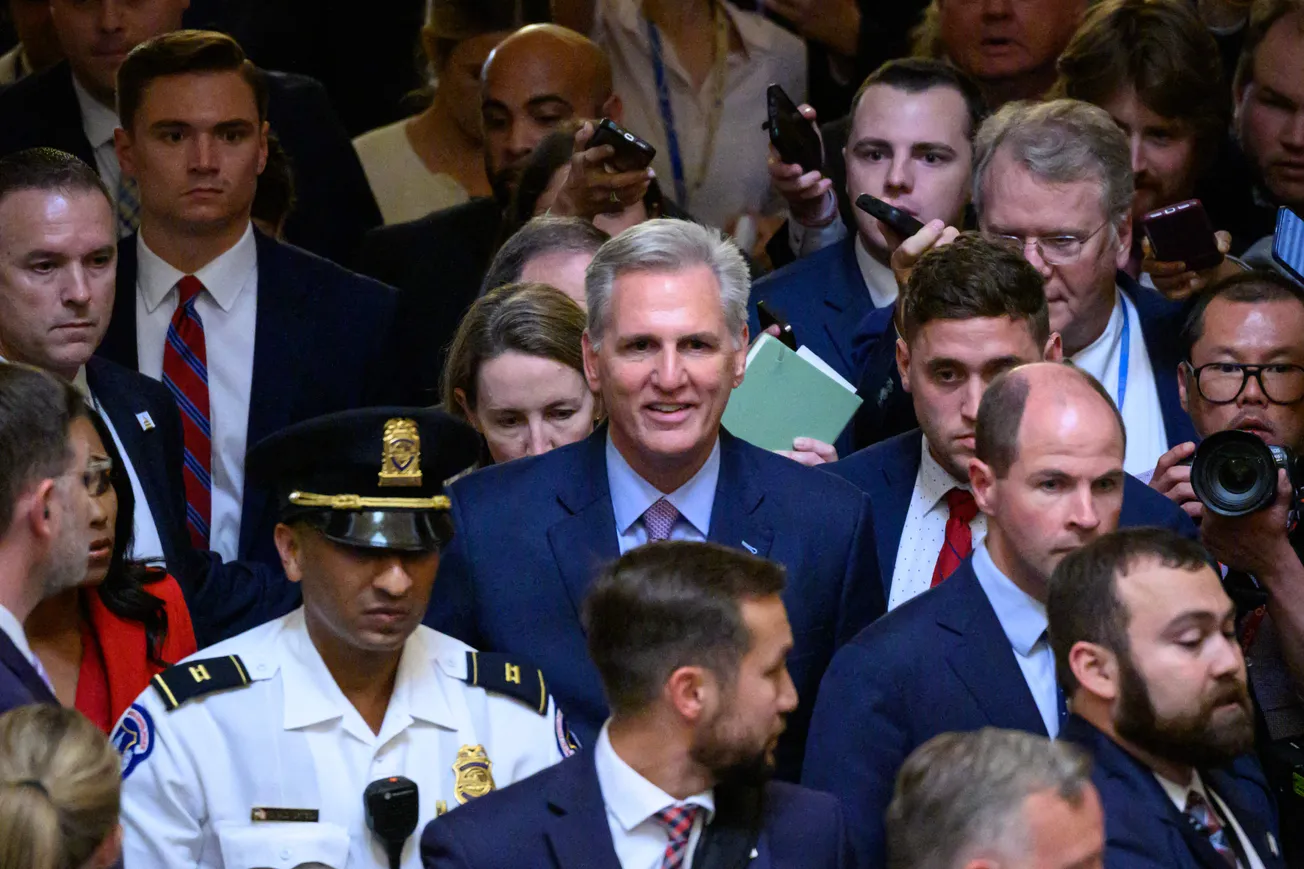- Kevin McCarthy was ousted as Speaker of the House in a historic vote with a final count of 216-210, and the media attributed this to eight "right-wing" Republicans
- Democrats strategically voted with the eight Republicans to bring down McCarthy, as they aimed to showcase GOP incompetence and potentially win back the House in 2024
- McCarthy had removed funding for Ukraine from a government shutdown vote, and the Ukraine funding issue became central to the Speaker's vote
- The vote may signal a shift in sentiment against the Ukraine war, and the Democrats inadvertently undermined their own president's policy priority
The media blamed the vote that ousted Kevin McCarthy as Speaker of the House, a historic outcome that has never happened before, on eight "right-wing," "hardline," MAGA Republicans. The final vote was 216-210.
Technically, the media narrative was true. When Kevin McCarthy was elected Speaker in January after fifteen grueling rounds of voting, he agreed to several concessions with his conservative flank. Chief among them was that any member could express displeasure with his leadership and bring a British-style "no confidence" vote in the entire House. He had gambled that such a vote would never come up. It did yesterday, and he lost when all Democrats voted unanimously against him.
We are reminded of how late British Prime Minister "Iron Lady" Margaret Thatcher, who convinced a wobbly George Bush 41 to liberate Kuwait from Saddam Hussain's invasion during the first Gulf War, was ousted from Number 10 Downing Street in an internal party vote. Tucked into the rules of the British Parliament is one that empowers a group of MPs to bring a ‘vote of no confidence.’ Thatcher's aides never saw this vote brewing. At the height of the short Gulf War that had consumed the British leader, the detractors held such a vote and shocked Thatcher. An obscure back-bencher, John Major, became Prime Minister and served for seven long years.
But, underneath the hood, what occurred on Tuesday was the risk of a prominent political gamble the Democrats took, something the media failed to cover. Intent on showing that the GOP can't govern - a message that former Speaker Pelosi and Senate Majority Leader Chuck Schumer likes to rub in at every opportunity - and hoping for a chance to take back the House in 2024, the Democrats unilaterally voted with the eight Republicans to bring McCarthy down. In so doing, the Democrats placed President Biden's Ukraine war funding priority and future funding requests at significant risk.
What led to yesterday's vote. During last week's vote to avoid a government shutdown, McCarthy engineered a miracle by removing not just Biden's $24 billion emergency aid request for the Ukraine war but even the $6 billion that the Senate had overwhelmingly approved in its own version of the Continuing Resolution. There was not one dollar for Ukraine. Not one.
The Senate grudgingly passed the House version, and a government shutdown was averted. No senator wanted to be on record to let the U.S. government shut down only because Ukraine had won no money, although Ukraine was foremost on most senators' minds, including several GOP senators.
In typical Beltway swamp style, Ukraine sympathizers let trial balloons float after that vote that the money would be found after all. Even President Zelenskyy, the clever politician he is, predicted that American support for Ukraine would never waver, indirectly continuing the pressure campaign he had unleashed when he visited Washington a few weeks ago. President Biden, speaking gibberish, let it slip that there even was a "deal" with McCarthy that would reinject all withheld war funding for Ukraine. In her typical style, White House Press Secretary KJP refused to take questions about the "deal," asserting that Biden's words stood on their own.
The media manipulation proved extraordinarily expensive to the Beltway Neocons as the revolt among McCarthy's detractors intensified. What was just four potential GOP members who initially challenged his leadership increased to eight, with a sufficient margin to sink his speakership. Rep. Chip Roy (R., Texas), a conservative Republican, had made it clear before the vote he would support McCarthy but that all bets were off if Ukraine war funding was included. Roy actually voted to keep McCarthy as speaker because McCarthy had zeroed out all dollars for Ukraine, but there were a few who detested the trial balloon talk of a deal that voted against McCarthy.
The Ukraine funding issue became so integral to the debate that the NY Times reported that McCarthy said "unequivocally no" to the question about a secret side deal on Ukraine. He said he and the White House discussed only the "transferability" issue, presumably referring to whether the administration could still send weapons to Ukraine.
McCarthy could have saved his speakership if he had shown more leadership on the Ukraine war funding issue without taking a particular stand. Over six weeks ago, we suggested that he invite war critics to testify so that Americans could know the truth eighteen months into this prolonged war that has killed over 500,000 soldiers and displaced more than 11 million Ukrainians. We have noted dozens of times that the media reporting has been lopsided absent Congressional authorization to declare war, mainly repeating administration talking points. We have also criticized the administration's moving the goalposts, first to say that funding is required to help Ukraine defend its sovereignty, and recently, as the counteroffensive is failing, to insist that weakening Russia's military power is a strategic American priority. GOP presidential contenders Mike Pence, Nikki Haley, and Chris Christie have also been in lock-step with the administration.
In his defense, McCarthy was never desperate to fund the Ukraine war. Even before assuming the role that placed him third-in-line to the presidency, he had warned that he would not sign a blank check. But the Democrats were always desperate to fund Ukraine, and after the vote, they lost a lot more than McCarthy.
The House controls the purse strings of the United States, and a GOP House is here to stay until January 2025. Whoever becomes speaker next knows their position is safe only if they address numerous conservative priorities - such as passing individual appropriation bills, strengthening the Southern border, and addressing the debt. High on this list would be severely restricting or eliminating funding for the Ukraine war.
A new GOP speaker could always depend on Democratic support alone - sending money to Ukraine or surviving a future vote to oust them. But that would create so much chaos amongst House Republicans. Imagine a GOP speaker walking to the dictates of the Democrats and subservient to them for keeping them in power.
As the war grinds on, Ukraine is crippled without American funding. As we noted recently, Slovakia has already elected Robert Fico, the former Prime Minister and leader of the SMER party, who campaigned on withdrawing all support to Ukraine.
The significance of the vote on Tuesday is that the tide may be finally turning against the war. And it was the Democrats that helped doom their President's most important policy priority.
Like our insights? Show your support by becoming a paid subscriber!








